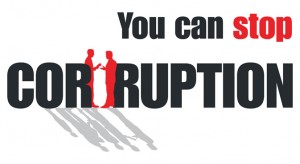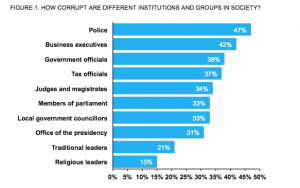Ghana among worst three in corruption perception survey
 Ghana is among the three worst performers in a new survey by Transparency International on change and improvement in corruption across Africa.
Ghana is among the three worst performers in a new survey by Transparency International on change and improvement in corruption across Africa.
Transparency International’s latest report “People and Corruption: Africa Survey 2015” was done with the partnership of Afrobarometer and sampled 43,143 people across 28 sub-Saharan African countries.
According to the survey released today December 1, 2015, a majority of Africans say corruption has risen in the past 12 months and most governments are seen as failing in their duty to stop the abuse of power, bribery and secret deals, and Transparency International estimates that 75 million African citizens paid bribes in the last year.
Ghana was second among the three with 76 per cent indicating that corruption has increased, followed closely by Nigeria with 75 per cent and led by South Africa with 83 per cent of respondents saying corruption has worsened.
Ghana also ranks 7th among the 28 countries by the prevalence of bribery for public services and the extent of citizens’ perception that government is not doing well against corruption. As much as 71 per cent of the Ghanaian respondents said government is not doing well in the fight against corruption.
“In Sierra Leone, Nigeria, Liberia and Ghana, citizens are the most negative about the scale of corruption in their country”, the report says
Neighbouring Burkina Faso and Côte d’Ivoire are among the best on the perception of corruption increase, with only 28 per cent saying corruption has worsened in Burkina Faso and 32 per cent in Côte d’Ivoire.
Mali also had a modest 31 per cent saying corruption has increased.
According to the report, a 58 per cent majority of Africans say corruption has increased over the past year and out of the 28 countries surveyed, 18 per cent are perceived to be completely losing the fight against corruption.
The police are perceived to be the most corrupt institution (47 per cent), followed by business executives (42 per cent), government officials (38 per cent), tax officials (37 per cent), judges and magistrates (34 per cent) and parliamentarians (33 per cent).
Within the past year, 22 per cent of Africans who came into contact with a public service, paid a bribe, with the police and courts being the most likely offenders.
courts being the most likely offenders.
Only 53 per cent in Ghana and the rest of the countries believe that ordinary people can make a difference in the fight against corruption.
The 53 per cent in this region was the area in which Ghana held the most positive perception.
Transparency International says while a strong civil society is crucial to fighting corruption, many in civil society receive threats and whistleblowers are not protected enough, making the fight against corruption difficult.
“Governments must create safe conditions for civil society to undertake anti-corruption work, and governments need to guarantee the operational and physical freedom of such organisations”
By Emmanuel Odonkor
